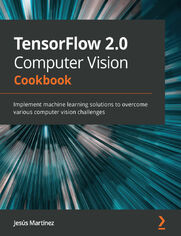TensorFlow 2.0 Computer Vision Cookbook - Helion

Tytuł oryginału: TensorFlow 2.0 Computer Vision Cookbook
ISBN: 9781838820688
stron: 542, Format: ebook
Data wydania: 2021-02-26
Ksi─Ögarnia: Helion
Cena ksi─ů┼╝ki: 107,10 z┼é (poprzednio: 119,00 z┼é)
Oszczędzasz: 10% (-11,90 zł)
Get well versed with state-of-the-art techniques to tailor training processes and boost the performance of computer vision models using machine learning and deep learning techniques
Key Features
- Develop, train, and use deep learning algorithms for computer vision tasks using TensorFlow 2.x
- Discover practical recipes to overcome various challenges faced while building computer vision models
- Enable machines to gain a human level understanding to recognize and analyze digital images and videos
Book Description
Computer vision is a scientific field that enables machines to identify and process digital images and videos. This book focuses on independent recipes to help you perform various computer vision tasks using TensorFlow.
The book begins by taking you through the basics of deep learning for computer vision, along with covering TensorFlow 2.x's key features, such as the Keras and tf.data.Dataset APIs. You'll then learn about the ins and outs of common computer vision tasks, such as image classification, transfer learning, image enhancing and styling, and object detection. The book also covers autoencoders in domains such as inverse image search indexes and image denoising, while offering insights into various architectures used in the recipes, such as convolutional neural networks (CNNs), region-based CNNs (R-CNNs), VGGNet, and You Only Look Once (YOLO).
Moving on, you'll discover tips and tricks to solve any problems faced while building various computer vision applications. Finally, you'll delve into more advanced topics such as Generative Adversarial Networks (GANs), video processing, and AutoML, concluding with a section focused on techniques to help you boost the performance of your networks.
By the end of this TensorFlow book, you'll be able to confidently tackle a wide range of computer vision problems using TensorFlow 2.x.
What you will learn
- Understand how to detect objects using state-of-the-art models such as YOLOv3
- Use AutoML to predict gender and age from images
- Segment images using different approaches such as FCNs and generative models
- Learn how to improve your network's performance using rank-N accuracy, label smoothing, and test time augmentation
- Enable machines to recognize people's emotions in videos and real-time streams
- Access and reuse advanced TensorFlow Hub models to perform image classification and object detection
- Generate captions for images using CNNs and RNNs
Who this book is for
This book is for computer vision developers and engineers, as well as deep learning practitioners looking for go-to solutions to various problems that commonly arise in computer vision. You will discover how to employ modern machine learning (ML) techniques and deep learning architectures to perform a plethora of computer vision tasks. Basic knowledge of Python programming and computer vision is required.
Osoby które kupowały "TensorFlow 2.0 Computer Vision Cookbook", wybierały także:
- Windows Media Center. Domowe centrum rozrywki 66,67 zł, (8,00 zł -88%)
- Przyw├│dztwo w ┼Ťwiecie VUCA. Jak by─ç skutecznym liderem w niepewnym ┼Ťrodowisku 58,64 z┼é, (12,90 z┼é -78%)
- Wireshark. Kurs video. Zaawansowana analiza danych i ruchu sieciowego z wykrywaniem w 192,31 zł, (50,00 zł -74%)
- Wireshark. Kurs video. Analiza ruchu sieciowego i wykrywanie w 192,31 zł, (50,00 zł -74%)
- Mapa Agile & Scrum. Jak si 57,69 zł, (15,00 zł -74%)
Spis tre┼Ťci
TensorFlow 2.0 Computer Vision Cookbook. Implement machine learning solutions to overcome various computer vision challenges eBook -- spis tre┼Ťci
- 1. Getting Started with TensorFlow 2.x for Computer Vision
- 2. Performing Image Classification
- 3. Harnessing the Power of Pre-Trained Networks with Transfer Learning
- 4. Enhancing and Styling Images with DeepDream, Neural Style Transfer, and Image Super-Resolution
- 5. Reducing Noise with Autoencoders
- 6. Generative Models and Adversarial Attacks
- 7. Captioning Images with CNNs and RNNs
- 8. Fine-Grained Understanding of Images through Segmentation
- 9. Localizing Elements in Images with Object Detection
- 10. Applying the Power of Deep Learning to Videos
- 11. Streamlining Network Implementation with AutoML
- 12. Boosting Performance





